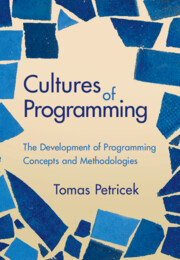Metrics
Full text views
Full text views help Loading metrics...
Loading metrics...
* Views captured on Cambridge Core between #date#. This data will be updated every 24 hours.
Usage data cannot currently be displayed.

What defines a correct program? What education makes a good programmer? The answers to these questions depend on whether programs are seen as mathematical entities, engineered socio-technical systems or media for assisting human thought. Programmers have developed a wide range of concepts and methodologies to construct programs of increasing complexity. This book shows how those concepts and methodologies emerged and developed from the 1940s to the present. It follows several strands in the history of programming and interprets key historical moments as interactions between five different cultures of programming. Rooted in disciplines such as mathematics, electrical engineering, business management or psychology, the different cultures of programming have exchanged ideas and given rise to novel programming concepts and methodologies. They have also clashed about the nature of programming; those clashes remain at the core of many questions about programming today. This title is also available as Open Access on Cambridge Core.
‘Tomas Petricek's engaging and very readable book argues that programming is a complex human activity that must be understood from multiple perspectives. Written with deep and sympathetic understanding, it provides a unique overview of the history of programming and programming languages and profound insights into current practice that will help demystify the ‘black art’ of coding.’Mark Priestley, National Museum of Computing
‘Is programming a practice of hacking, engineering, mathematics, management, or humanities? As a computer scientist with the insights and style of a humanist, Petricek leads the reader through the last seventy years of programming to show how these practices have both persisted independently and interacted to produce key technical and methodological innovations through their disputes and synergies.’Warren Sack, University of California, Santa Cruz, author of The Software Arts
‘For some, computer programming is an abstract activity like mathematics; for others, an act of craftsmanship; for others, an industrial tool of organisation and control. This book presents a history of programming that preserves all these different points of view; indeed, it shows that these different ‘cultures’ (and others) have been crucial to its development and success.’Simone Martini, University of Bologna
 Loading metrics...
Loading metrics...
* Views captured on Cambridge Core between #date#. This data will be updated every 24 hours.
Usage data cannot currently be displayed.
This section outlines the accessibility features of this content - including support for screen readers, full keyboard navigation and high-contrast display options. This may not be relevant for you.
Accessibility compliance for the PDF of this book is currently unknown and may be updated in the future.